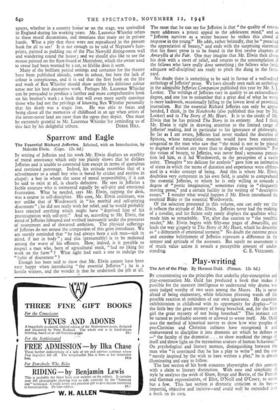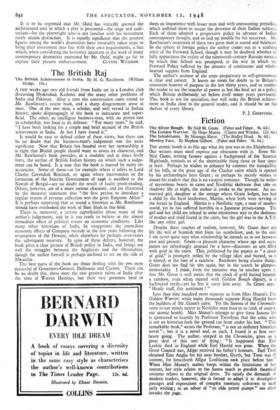Play-writing
The Art of the Play. By Hermon Ould. (Pitman. 12s. 6d.) By concentrating on the principles that underlie play-conception and play-construction Mr. Ould has produced a book that makes it possible for the meanest intelligence to understand why drama was once judged worthy of two seats among the Muses. He is never afraid of being elementary, while felicitous phrasing wards off the possible reaction tb reminders of our own ignorance. He examines exhibitionism in childhood with its opportunity for diiplay—" for the little boy the great mystery of being breeched, and, for the little girl the great mystery of not being breeched." This instinct can be turned to profitable account or allowed to waste itself. Mr. Ould uses the method of historical survey to show haw wise peoples of pre-Christian and Christian cultures have recognised it and endeavoured to discipline it into dramatic art which he defines as —" the faculty of the dramatist . . . to show mankind the image of itself and throw light on the mysterious sources of human behaviour." On pSychological and literary matters, distinguishing between the man who " is convinced that he has a play to write " and the one " merely inspired by the wish to have written a play," he is always illuminating and easy to follow. The last section of his book concerns playwrights of this century with a claim to literary 'distinction. With ease and simplicity of style he analyses the work of Shaw, Synge and Barrie, of the French and German expressionists, of Eliot, O'Neill and O'Casey, to name but a few. This last section is dramatic criticism at its best— impartial, objective and incisive—and could well be expanded into a book on its own.
It is to be regretted that Mr. Ould has virtually ignored the architectural unit in which a play is presented—the stage and audi- torium—for the playwright who is not familiar with his instrument rarely attains distinction. It is equally significant that the greatest figures among the world's dramatists have invariably taken steps to bring their instrument into line with their own requirements, a fact which, when considering the hesitancy apparent in the work of many contemporary dramatists examined by Mr. Ould, might go far to
explain their present embarrassment. GLYNNE WICKHAM.



































 Previous page
Previous page